Crime and Policing
Women’s involvement with and contraventions of law and order tell us a lot about the way attitudes towards womanhood and femininity evolved in particular historical moments.
Female criminals, such as Victorian Liverpool’s notorious Flanagan sisters, brought the idea that women had a “natural” propensity towards caregiving into disrepute. But, while some women challenged society by breaking the law, other women challenged society by striving to become part of the maintenance of law and order.
For example, in 1914 Liverpool’s Women Police Patrols were established, though they were not part of the city’s official (and male!) police force. Indeed, they would not become part of the city’s official police until 1948. Sisters of Mersey charts women’s experiences of law and order and demonstrates that the history of crime and policing is highly gendered.
Whether women were breaking the law, or striving to implement order, questions about their femininity and their place in society shaped understandings of women’s relationship to crime and policing.
Dr Samantha Caslin
University of Liverpool
Download our Sisters of Mersey app (on the App Store and Google Play) to discover more about the local women who have campaigned and dedicated themselves to achieving equality
Meet the Liverpool Women Police Patrols on our Sisters of Mersey app:
Liverpool Women Police Patrols’ Office: 5 Cases Street

Cases Street, home to Liverpool Women Police Patrols during the interwar years. Photo: S Caslin, 2019
Following the outbreak of the First World War in August 1914, there was widespread concern in Britain about the effect that the war would have upon the morality of young women. The Liverpool Women Police Patrols were established in November 1914. They were especially concerned with deterring young women from loitering about in areas popular with servicemen and with preventing teenage couples from courting in parks. The Liverpool Women Police Patrols were supported by the National Council of Women, the National Union of Women’s Suffrage Societies and public donations. By the end of the war, the Patrols were given an expenses grant by the Liverpool Watch Committee. The Liverpool Women Police Patrols did not have the power to arrest people and they did not become part of Liverpool’s official police force until 1948.
During the interwar years, the Liverpool Women Police Patrols’ office was based in 5 Cases Street, Clayton Square. The office was open between 10am and 10.30pm, except on Sundays when it was open from 6pm until 10.30pm.
Dr Samantha Caslin
University of Liverpool
Further reading
S Caslin, Save the Womanhood: Vice, urban immorality and social control in Liverpool, c. 1900-1976 (Liverpool: Liverpool University Press, 2018).